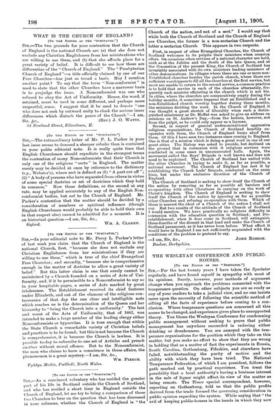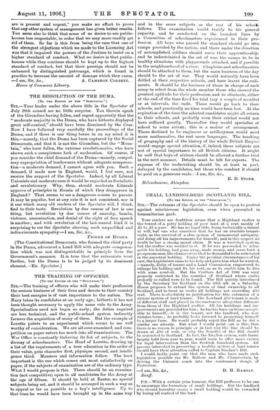THE WESLEYAN CONFERENCE AND PUBLIC- HOUSES.
[To THE EDITOR or THE "SPECTATOR."]
Slit,—For the last twenty years I have taken the Spectator regularly, and have found myself in sympathy with most of its opinions. Surely, however, your methods of argument change when you approach the problems connected with the temperance question. On other subjects you are as ready as any of your readers to take a judicial view, and no one insists more upon the necessity of following the scientific method of sifting all the facts of experience before coming to a con- clusion. Where temperance questions are concerned all this seems to be changed, and experience gives place to unsupported theory. You blame the Wesleyan Conference for condemning public management without seeking to prove that public, management has anywhere succeeded in reducing either drinking or drunkenness. You are annoyed with the tem- perance organisations for the position which they take on this matter, but you make no effort to show that they are wrong in holding that as a matter of fact the experiments in Russia, South Carolina, Gothenburg, Fifeshire, and elsewhere have failed, notwithstanding the purity of motive and the ability with which they have been tried. The National Temperance Federation, of which I am president, follows the path marked out by practical experience. You treat the possibility that a local authority's having a business interest in the sale of liquor might affect its view of the matter as being remote. The Times special correspondent, however, reporting on Gothenburg, told us that the public profits derived from the trade formed the governing consideration in public opinion regarding the system. While saying that "the evil of keeping public-houses in the hands in which they now
are is present and urgent," you make no effort to prove that any other system of management has given better results. You seem also to think that some of us desire to see public- houses less respectable, in order that we may more readily get rid of them. So far is this from being the case that one of the strongest objections which we made to the Licensing Act was that it impaired the powers of the Justices to insist on a higher standard of conduct. What we desire is that public- houses while they continue should be kept up to the highest standard of conduct, but that their prestige should not be enhanced by distinguished patronage, which is found in practice to increase the amount of damage which they cause.



































 Previous page
Previous page